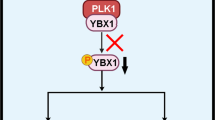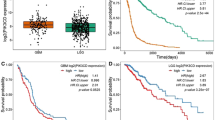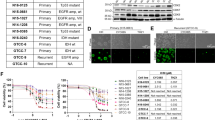Abstract
Glioblastoma (GBM) is one of the most aggressive central nervous system tumors with a patient’s median survival of <1 year. Polo-like kinases (PLKs) are a family of serine/threonine kinases that have key roles in cell cycle control and DNA-damage response. We evaluated PLK1, 2, 3 and 4 gene expression in 8 GBM cell lines and 17 tumor samples, and analyzed the effect of the PLK1 inhibition on SF188 and T98G GBM cell lines and 13 primary cultures. Our data showed PLK1 overexpression and a variable altered expression of PLK2, 3 and 4 genes in GBM tumor samples and cell lines. Treatments with nanomolar concentrations of BI 2536, BI 6727, GW843682X or GSK461364 caused a significant decrease in GBM cells proliferation. Colony formation was also found to be inhibited (P<0.05), whereas apoptosis rate and mitotic index were significantly increased (P<0.05) after PLK1 inhibition in both GBM cell lines. Cell cycle analysis showed an arrest at G2 (P<0.05) and cell invasion was also decreased after PLK1 inhibition. Furthermore, simultaneous combinations of BI 2536 and temozolomide produced synergistic effects for both the cell lines after 48 h of treatment. Our findings suggest that PLK1 might be a promising target for the treatment of GBMs.
This is a preview of subscription content, access via your institution
Access options
Subscribe to this journal
Receive 12 print issues and online access
$259.00 per year
only $21.58 per issue
Buy this article
- Purchase on SpringerLink
- Instant access to full article PDF
Prices may be subject to local taxes which are calculated during checkout




Similar content being viewed by others
References
Yang S, Liu J, Wang T, Li X, You C . Cerebellar glioblastoma multiforme: a retrospective study of 28 patients at a single institution. Int J Neurosci 2013 doi:10.3109/00207454.2013.791292.
Khalatbari MR, Hamidi M, Moharamzad Y . Glioblastoma multiforme with very rapid growth and long-term survival in children: report of two cases and review of the literature. Childs Nerv Syst 2011; 27: 1347–1352.
Slotty PJ, Siantidis B, Beez T, Steiger HJ, Sabel M . The impact of improved treatment strategies on overall survival in glioblastoma patients. Acta Neurochir (Wien) 2013; 155: 959–963.
Brandes AA, Tosoni A, Franceschi E, Reni M, Gatta G, Vecht C . Glioblastoma in adults. Crit Rev Oncol Hematol 2008; 67: 139–152.
Strebhardt K . Multifaceted polo-like kinases: drug targets and antitargets for cancer therapy. Nat Rev Drug Discov 2010; 9: 643–660.
Bruinsma W, Raaijmakers JA, Rh Medema . Switching Polo-like kinase-1 on and off in time and space. Trends Biochem Sci 2012; 37: 534–542.
Winkles JA, Alberts GF . Differential regulation of polo-like kinase 1, 2, 3, and 4 gene expression in mammalian cells and tissues. Oncogene 2005; 24: 260–266.
Chopra P, Sethi G, Dastidar SG, Ray A . Polo-like kinase inhibitors: an emerging opportunity for cancer therapeutics. Expert Opin Investig Drugs 2010; 19: 27–43.
Sanhaji M, Louwen F, Zimmer B, Kreis NN, Roth S, Yuan J . Polo-like kinase 1 inhibitors, mitotic stress and the tumor suppressor p53. Cell Cycle 2013; 12: 1340–1351.
Garuti L, Roberti M, Bottegoni G . Polo-like kinases inhibitors Curr Med Chem. 2012; 19: 3937–3948.
Johnson EE, Stewart KD, Woods KW, Giranda VL, Luo Y . Pharmacological and functional comparison of the polo-like kinase family: insight into inhibitor and substrate specificity. Biochemistry 2007; 46: 9551–9563.
Murugan RN, Park JE, Kim EH, Shin SY, Cheong C, Lee KS et al. Plk1-targeted small molecule inhibitors: molecular basis for their potency and specificity. Mol Cells 2011; 32: 209–220.
Steegmaier M, Hoffmann M, Baum A, Lénárt P, Petronczki M, Krssák M . BI 2536, a potent and selective inhibitor of polo-like kinase 1, inhibits tumor growth in vivo. Curr Biol 2007; 17: 316–322.
Valente V, Teixeira SA, Neder L, Okamoto OK, Oba-Shinjo SM, Marie SK et al. Selection of suitable housekeeping genes for expression analysis in glioblastoma using quantitative RT-PCR. BMC Mol Biol 2009; 10: 17.
Livak KJ, Schmittgen TD . Analysis of relative gene expression data using real-time quantitative PCR and the 2−ΔΔCt method. Methods 2001; 25: 402–408.
Franken NA, Rodermond HM, Stap J, Haveman J, van Bree C . Clonogenic assay of cells in vitro. Nat Protoc 2006; 1: 2315–2319.
Chou TC, Talalay O . Quantitative analysis of dose-effect relationships: the combined effects of multiple drugs or enzyme inhibitors. Adv Enzyme Regul 1984; 22: 27–55.
Khasraw M, Lassman AB . Advances in the treatment of malignant gliomas. Curr Oncol Rep 2012; 12: 26–33.
Stupp R, Newlands E . New approaches for temozolomide therapy: use in newly diagnosed glioma. Semin Oncol 2001; 28: 19–23.
Dietzmann K, Kirches E, von Bossanyi K, Jachau K, Mawrin C . Increased human polo-like kinase-1 expression in gliomas. J Neurooncol 2001; 53: 1–11.
Wasch R, Hasskarl J, Schnerch D, Lübbert M . BI_2536-targeting the mitotic kinase Polo-like kinase 1 (Plk1). Recent Results Cancer Res 2010; 184: 215–218.
Lee C, Fotovati A, Triscott J, Chen J, Venugopal C, Singhal A et al. Polo-Like Kinase 1 (PLK1) inhibition kills glioblastoma multiforme brain tumour cells in part through loss of SOX2 and delays tumour progression in mice. Stem Cells 2012; 30: 1064–1075.
Hu K, Lee C, Qiu D, Fotovati A, Davies A, Abu-Ali S et al. Small interfering RNA library screen of human kinases and phosphatases identifies polo-like kinase 1 as a promising new target for the treatment of pediatric rhabdomyosarcomas. Mol Cancer Ther 2009; 8: 3024–3035.
Shen T, Li Y, Yang L, Xu X, Liang F, Liang S et al. Upregulation of Polo-like kinase 2 gene expression by GATA-1 acetylation in human osteosarcoma MG-63 cells. Int J Biochem Cell Biol 2012; 44: 423–429.
Syed N, Coley HM, Sehouli J, Koensgen D, Mustea A, Szlosarek P et al. Polo-like kinase Plk2 is an epigenetic determinant of chemosensitivity and clinical outcomes in ovarian cancer. Cancer Res 2011; 71: 3317–3327.
Mito K, Kashima K, Kikuchi H, Daa T, Nakayama I, Yokoyama S . Expression of Polo-Like Kinase (PLK1) in non-Hodgkin's lymphomas. Leuk Lymphoma 2005; 46: 225–231.
Amadori D, Volpi A, Maltoni R, Nanni O, Amaducci L, Amadori A et al. Cell proliferation as a predictor of response to chemotherapy in metastatic breast cancer: a prospective study. Breast Cancer Res Treat 1997; 43: 7–14.
Mitchison T.J . The proliferation rate paradox in antimitotic chemotherapy. Mol Biol Cell 23: 1–6 2012.
Archambault V, Glover DM . Polo-like kinases: conservation and divergence in their functions and regulation. Nat Rev Mol Cell Biol 2009; 10: 265–275.
Pellegrino R, Calvisi DF, Ladu S, Ehemann V, Staniscia T, Evert M et al. Oncogenic and tumor suppressive roles of polo-like kinases in human hepatocellular carcinoma. Hepatology 2010; 51: 857–868.
Rosario CO, Ko MA, Haffani YZ, Gladdy RA, Paderova J, Pollett A et al. Plk4 is required for cytokinesis and maintenance of chromosomal stability. Proc Natl Acad Sci USA 2010; 107: 6888–6893.
Macmillan JC, Hudson JW, Bull S, Dennis JW, Swallow CJ . Comparative expression of the mitotic regulators SAK and PLK in colorectal cancer. Ann Surg Oncol 2001; 8: 729–7402.
Soussi T . Handbook OF p53 Mutation in Cell Lines. Version 1.0 07/2007 http://p53.free.fr/Database/Cancer_cell_lines/cell_lines_1.0.pdf.
Guan R, Tapang P, Leverson JD, Giranda VL, Luo Y . Small interfering RNA-mediated Polo-like kinase 1 depletion preferentially reduces the survival of p53-defective, oncogenic transformed cells and inhibits tumor growth in animals. Cancer Res 2005; 65: 2698–2704.
Renner AG, Dos Santos C, Recher C, Bailly C, Créancier L, Kruczynski A et al. Polo-like kinase 1 is overexpressed in acute myeloid leukemia and its inhibition preferentially targets the proliferation of leukemic cells. Blood 2009; 114: 659–662.
Oliveira JC, Brassesco MS, Pezuk JÁ, Morales AG, Valera ET, Montaldi AP et al. In vitro PLK1 inhibition by BI 2536 decreases proliferation and induces cell-cycle arrest in melanoma cells. J Drugs Dermatol 2012; 11: 587–592.
Pezuk JA, Brassesco MS, Oliveira JC, Morales AG, Montaldi AP, Sakamoto-Hojo ET et al. Antiproliferative in vitro effects of BI 2536-mediated PLK1 inhibition on cervical adenocarcinoma cells. Clin Exp Med 2013; 13: 75–80.
Morales AG, Brassesco MS, Pezuk JA, Morales AG, Montaldi AP, Sakamoto-Hojo ET et al. BI 2536-mediated PLK1 inhibition suppresses HOS and MG-63 osteosarcoma cell line growth and clonogenicity. Anticancer Drugs 2011; 22: 995–1001.
Wolf S, Lorenz J, Mossner J, Wiedmann M . Treatment of biliary tract cancer with NVP-AEW541: mechanisms of action and resistance. World J Gastroenterol 2010; 16: 156–166.
Maire V, Némati F, Richardson M, Vincent-Salomon A, Tesson B, Rigaill G et al. Polo-like Kinase 1: a potential therapeutic option in combination with conventional chemotherapy for the management of patients with triple-negative breast cancer. Cancer Res 2012; 73: 813–823.
Liu X, Choy E, Harmon D, Vincent-Salomon A, Tesson B, Rigaill G et al. Inhibition of polo-like kinase 1 leads to the suppression of osteosarcoma cell growth in vitro and in vivo. Anticancer Drugs 2011; 22: 444–453.
Plyte S, Musacchio A . PLK1 inhibitors: setting the mitotic death trap. Curr Biol 2007; 17: R280–R283.
Ianzini F, Mackey MA . Mitotic Catastrophe. In: Gewirtz DA, Holt SE (eds). Cancer Drug Discovery and Development Apoptosis, Senescence and Cancer. S Grant Humana Press Totowa, NJ, USA, 2007.
Vakifahmetoglu H, Olsson M, Zhivotovsky B . Death through a tragedy: mitotic catastrophe. Cell Death Differ 2008; 15: 1153–1162.
Yim H, Erikson RL . Polo-like kinase 1 depletion induces DNA damage in early S prior to caspase activation. Mol Cell Biol 2009; 29: 2609–2621.
Zhang Z, Zhang G, Kong C . High expression of polo-like kinase 1 is associated with the metastasis and recurrence in urothelial carcinoma of bladder. Urol Oncol 2011 doi:10.1016/urolonc.2011.11.028.
Han DP, Cui JT, Lu AG, Chen XH, Feng B, Zong YP et al. Influence of silencing Polo-like kinase 1 on migration and invasion of colorectal cancer cells. Zhonghua Wei Chang Wai Ke Za Zhi 2011; 14: 61–64.
Rizki A, Mott JD, Bissell MJ . Polo-like kinase 1 is involved in invasion through extracellular matrix. 2007 Cancer Res 67: 11106–11110.
Ellis PM, Chu QS, Leighl N, Laurie SA, Fritsch H, Gaschler-Markefski B et al. A Phase I open-label dose-escalation study of intravenous BI 2536 together with pemetrexed in previously treated patients with non–small–cell lung cancer. Clin Lung Cancer 2013; 14: 19–27.
Frost A, Mross K, Steinbild S, Hedbom S, Unger C, Kaiser R et al. Phase i study of the Plk1 inhibitor BI 2536 administered intravenously on three consecutive days in advanced solid tumours. Curr Oncol 2012; 19: e28–e35.
Schoffski P, Blay JY, De Greve J, Brain E, Machiels JP, Soria JC et al. Multicentric parallel phase II trial of the polo-like kinase 1 inhibitor BI 2536 in patients with advanced head and neck cancer, breast cancer, ovarian cancer, soft tissue sarcoma and melanoma. The first protocol of the European Organization for Research and Treatment of Cancer (EORTC) Network of Core Institutes (NOCI). Eur J Cancer 2010; 46: 2206–2215.
Sebastian M, Reck M, Waller CF, Kortsik C, Frickhofen N, Schuler M et al. The efficacy and safety of BI 2536, a novel Plk-1 inhibitor, in patients with stage IIIB/IV non-small cell lung cancer who had relapsed after, or failed, chemotherapy: results from an open-label, randomized phase II clinical trial. J Thorac Oncol 2010; 5: 1060–1067.
Acknowledgements
We are grateful to Dr Elza Tiemi Sakamoto-Hojo and Ana Paula de Lima Montaldi (MSc) for facilitating cell cycle analysis, to Kleiton Borges Silva (MSc) for helping with the primary tumor cultures expansion, and to Veridiana Kiill Suazo (BSc) for technical assistance. We also thank the Foundation for Research Support of São Paulo (FAPESP # 2009/50118-2 and 2009/11053-2) and the Coordination of Improvement of Higher Education Personnel (CAPES) for financial support.
Author information
Authors and Affiliations
Corresponding author
Ethics declarations
Competing interests
The authors declare no conflict of interest.
Rights and permissions
About this article
Cite this article
Pezuk, J., Brassesco, M., Morales, A. et al. Polo-like kinase 1 inhibition causes decreased proliferation by cell cycle arrest, leading to cell death in glioblastoma. Cancer Gene Ther 20, 499–506 (2013). https://doi.org/10.1038/cgt.2013.46
Received:
Accepted:
Published:
Issue date:
DOI: https://doi.org/10.1038/cgt.2013.46



